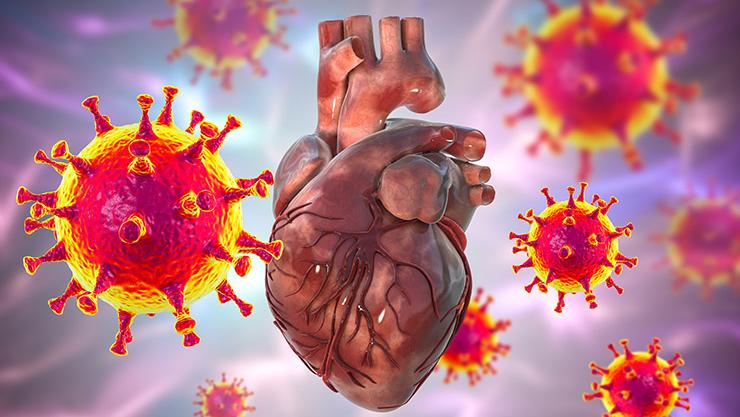As global research continues to uncover the long-term effects of COVID-19, one concerning revelation stands out: the virus can cause heart damage, even in people who have never had previous heart conditions. New data is confirming that COVID-19 doesn’t just target the lungs; it also has serious implications for the cardiovascular system. According to Dr. Sanjeev Patel, a cardiologist with Bayhealth, emerging evidence suggests the virus can cause structural heart issues and long-term cardiac complications.

How COVID-19 Affects the Heart
Heart Complications from COVID-19
While it was previously believed that only individuals with underlying heart conditions were at higher risk, new findings suggest that even healthy individuals, including young adults and athletes, can suffer cardiac injury post-infection. Dr. Patel explains that COVID-19 can trigger:
- Myocarditis (inflammation of the heart muscle)
- Ventricular Arrhythmias (irregular heartbeats)
- Acute Coronary Syndrome (reduced blood flow to the heart)
- Coronary Thrombosis (blood clots in the coronary arteries)
These complications can occur not only in severely ill, hospitalized patients, but also in asymptomatic and mildly symptomatic individuals.
Inflammatory Response and the “Cytokine Storm”
The most common entry point for the virus is the lungs. However, a strong immune reaction — referred to as a “cytokine storm”— can spread inflammation throughout the body, including the heart. This systemic inflammation can impair heart function and may lead to myocardial infarction (heart attack) in severe cases.
Silent Damage in Healthy Individuals
Asymptomatic Individuals at Risk
One of the more alarming trends is that even individuals who never exhibited symptoms of COVID-19 have shown signs of heart damage.
In some cases, post-infection MRI scans of young, physically fit individuals have revealed:
- Enlarged heart muscles
- Signs of inflammation
- Reduced heart function
These findings are concerning because they suggest that structural heart issues could develop silently, increasing the risk of heart failure or sudden cardiac arrest in the future.
Young Athletes and Cardiac Complications
Recent research points to young athletes being particularly vulnerable. In rare cases, sudden cardiac death has been documented among athletes who appeared to recover completely from COVID-19. Studies continue to monitor this group closely, as they represent a demographic previously considered low-risk.
Diagnostic Challenges
Gaps in Current Cardiac Testing
Dr. Patel emphasizes that traditional cardiac tests such as electrocardiograms (ECG) or echocardiograms may not detect structural damage in all patients. The subtle changes caused by post-COVID heart inflammation may require advanced imaging like cardiac MRIs for accurate diagnosis.
This gap in detection complicates long-term care, as many patients may not receive a proper diagnosis until symptoms become severe or life-threatening.
The Path Forward: Monitoring and Prevention
The Need for Continued Research
Although early findings are concerning, long-term studies are still needed to determine how lasting the heart effects of COVID-19 will be. Researchers aim to better understand the duration and severity of cardiac damage and how it may affect global rates of heart failure in the coming years.
What You Can Do to Protect Your Heart
Dr. Patel advises everyone—regardless of age or prior health status—to take preventive steps seriously:
- Get vaccinated and stay up to date with boosters
- Wear masks in crowded or high-risk environments
- Practice good hygiene
- Maintain regular checkups, especially if you have had COVID-19
People experiencing lingering symptoms such as chest pain, palpitations, fatigue, or shortness of breath after recovering from COVID-19 should consult a cardiologist.
Comprehensive Safety Measures
Honda Elevate ADAS-Level Precautions for Your Health
Just as advanced driver assistance systems (ADAS) are revolutionizing road safety, preventive healthcare is your first line of defense against heart complications. Early intervention, lifestyle changes, and regular screening can save lives.
FAQs
Q1: Can COVID-19 cause heart problems in healthy people?
A: Yes. Even individuals without pre-existing heart conditions have experienced heart inflammation, arrhythmias, and structural damage after COVID-19.
Q2: What symptoms suggest heart damage after COVID?
A: Watch for chest pain, palpitations, fatigue, dizziness, or shortness of breath. If you experience these symptoms, consult a healthcare provider immediately.
Q3: Are young adults and athletes at risk of heart complications?
A: Yes, even young, fit individuals have shown signs of heart muscle inflammation and structural abnormalities after recovering from COVID-19.
Q4: How can I protect my heart during the pandemic?
A: Get vaccinated, maintain a healthy lifestyle, and consult your doctor if you suspect any post-COVID symptoms.
Q5: Is regular heart testing necessary after COVID-19?
A: While not always necessary, those with lingering symptoms or who had a severe case of COVID-19 should undergo thorough cardiac evaluation..




